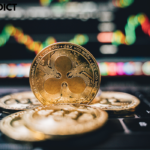The cryptocurrency market saw a significant boost on Monday, November 18, with the aggregate market capitalization increasing by $45 billion within 24 hours. This surge brought renewed optimism to the digital asset space, even as bearish sentiment prevailed in the derivatives market. Solana (SOL), Hedera (HBAR), and Stellar (XLM) were among the top-performing cryptocurrencies, capturing investor attention with impressive gains.
Market Highlights: Solana, Hedera, and Stellar Shine
The rally was driven by strong performances from several key altcoins:
- Solana (SOL):
Solana continued its recovery momentum, bolstered by growing adoption of its blockchain ecosystem and renewed interest in its high-speed, low-cost capabilities. The network’s ability to attract developers and users contributed to its price surge, making it one of the top gainers of the day. - Hedera (HBAR):
Hedera’s HBAR token also saw a significant uptick, driven by its expanding network partnerships and enterprise adoption. The token’s performance highlights the increasing confidence in Hedera’s unique hashgraph technology, which is positioned as an efficient alternative to traditional blockchain systems. - Stellar (XLM):
Stellar’s rise reflects growing interest in blockchain-based financial solutions. Known for its focus on cross-border payments and financial inclusivity, Stellar has benefited from increased usage and partnerships in the global payments space, further solidifying its market position.
Derivatives Market: Bears Take Control
While the spot market saw gains, the derivatives market painted a more cautious picture. Bears took the upper hand, leading to significant liquidations of long positions. In the last 24 hours, $179 million worth of long contracts were liquidated, accounting for 58% of the total $305 million in liquidations during this period.
This trend highlights ongoing volatility in the derivatives market, with leveraged traders facing challenges amid rapid price swings. The dominance of bearish sentiment suggests that traders remain cautious, balancing bullish momentum in the spot market against uncertainties in macroeconomic conditions and regulatory developments.
What’s Fueling the Market Movement?
The increase in market capitalization and standout performances by Solana, Hedera, and Stellar can be attributed to several factors:
- Improving Market Sentiment:
The broader crypto market has experienced a gradual recovery, fueled by growing adoption and interest in blockchain technology across industries. - Altcoin Resilience:
As Bitcoin and Ethereum maintain relative stability, altcoins like Solana, Hedera, and Stellar have seized the spotlight, benefiting from ecosystem developments and increased utility. - Macro Factors:
While the derivatives market suggests cautious sentiment, the spot market gains reflect optimism around cryptocurrencies’ long-term potential as inflation hedges and innovative financial instruments.
What’s Next for the Crypto Market?
The crypto market’s $45 billion growth signals renewed confidence, but the underlying volatility in the derivatives space serves as a reminder of the sector’s unpredictability. As investors watch for further developments, the following factors could shape the market’s trajectory:
- Altcoin Momentum:
Continued ecosystem growth and adoption could drive further gains for top-performing altcoins like Solana, Hedera, and Stellar. - Macroeconomic Conditions:
Interest rate policies, regulatory updates, and global economic trends will remain critical in shaping investor sentiment. - Derivatives Market Stability:
Reduced volatility and clearer trends in the derivatives market could help stabilize prices and encourage more balanced trading activity.
Conclusion
Monday’s $45 billion market cap increase underscores the dynamic nature of the cryptocurrency market, where altcoins like Solana, Hedera, and Stellar can outperform amidst broader sector growth. While the derivatives market shows lingering caution, the gains in the spot market reflect optimism and growing confidence in digital assets’ potential. As the week unfolds, investors will be closely monitoring altcoin performance and market conditions to gauge whether the upward trend can sustain itself or if further corrections are on the horizon.











